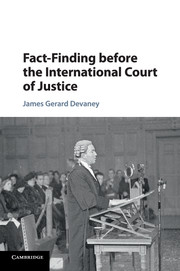Book contents
- Frontmatter
- Contents
- Table of cases
- Acknowledgements
- Introduction
- 1 Rules of evidence before the International Court of Justice
- 2 Criticisms of the Court's current reactive approach to fact-finding
- 3 The practice of other international courts and tribunals
- 4 Winds of change: the possibility of reform
- 5 A more proactive approach to fact-finding
- Epilogue
- Bibliography
- Index
4 - Winds of change: the possibility of reform
Published online by Cambridge University Press: 05 September 2016
- Frontmatter
- Contents
- Table of cases
- Acknowledgements
- Introduction
- 1 Rules of evidence before the International Court of Justice
- 2 Criticisms of the Court's current reactive approach to fact-finding
- 3 The practice of other international courts and tribunals
- 4 Winds of change: the possibility of reform
- 5 A more proactive approach to fact-finding
- Epilogue
- Bibliography
- Index
Summary
Richard B. Lillich famously argued that the Court often fails ‘to take advantage of existing procedures to help unearth the facts that may be the key to the resolution of disputes’. This point was made and developed at length in Chapters 1 and 2. However, it is the conclusions that Lillich drew from this state of affairs that are the subject of this chapter, namely that the Court should ‘be far more aggressive in seeking the facts’ and utilising the fact-finding tools it already possesses. This chapter seeks to draw on the practice of the other international tribunals examined in Chapter 3 and suggests that there are a number of avenues open to the Court that could potentially remedy some of its current fact-finding weaknesses:
1. The first relates to the possibility of making greater use of the fact-finding powers that the Court already possesses. Section 4.1 explores the possibility of the Court taking a teleological approach to its Statute and Rules and the so-called duty of collaboration in asking whether the Court could construe its fact-finding powers to compel the production of evidence, as opposed to merely requesting it.
2. Secondly, the possibility of better utilising the Court's power to order provisional measures under Article 41 of its Statute is examined.
3. Thirdly, relating to both the fact-finding and fact-assessment processes, Section 4.3 explores the possibility of increased use of experts, the refinement of the current procedure for the presentation of expert evidence and greater use of cross-examination as a way of aiding the Court in effectively assessing the facts put before it by the parties.
Subsequently Chapter 5 examines the merits of taking a more proactive approach to fact-finding as facilitated in the manner set out in the present chapter.
Developing a power to compel the disclosure of evidence
The first avenue the Court could explore in taking a more proactive approach to the facts relates to the possibility of making greater use of the fact-finding powers the Court already possesses. This section explores the possibility of the Court taking a teleological approach to its Statute and Rules and relying on the so-called duty of collaboration in asking whether the Court could potentially construe its fact-finding powers to compel the production of evidence, as opposed to merely requesting it.
- Type
- Chapter
- Information
- Fact-Finding before the International Court of Justice , pp. 179 - 241Publisher: Cambridge University PressPrint publication year: 2016



